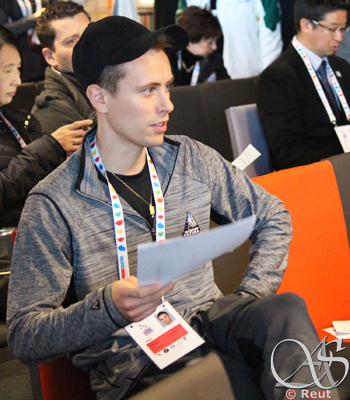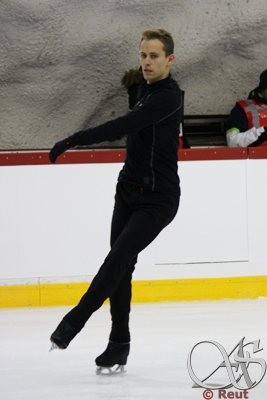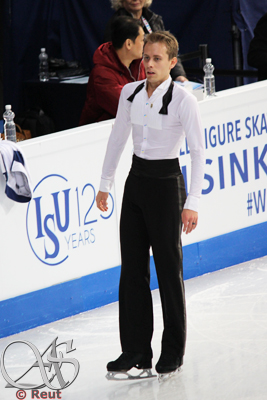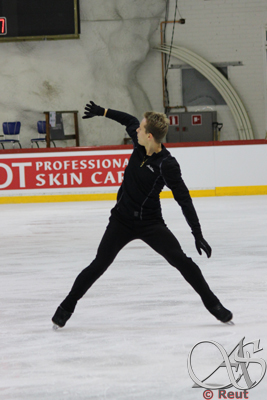Michal Březina: "I've proved myself that I'm not a coward"
May 21, 2017
By Titanilla Bőd (Új Szó)
Photos © Reut Golinsky
 He came to the mixed zone with huge ice packs on his left ankle. He placed 18th at Worlds, but he was glad that despite the injury he pushed himself through the competition. He is convinced that this experience will help him next season, too. Michal Březina talked to Absolute Skating about quads, risk, injuries and pain.
He came to the mixed zone with huge ice packs on his left ankle. He placed 18th at Worlds, but he was glad that despite the injury he pushed himself through the competition. He is convinced that this experience will help him next season, too. Michal Březina talked to Absolute Skating about quads, risk, injuries and pain.
What has happened to your foot?
I twisted my ankle three weeks ago, and I think I've just made it a little bit worse during the long program. I'm just happy that I was able to finish it here. On Saturday we got the MRI report back, and on Monday we weren't even sure if would be allowed by the doctors to skate. I'm just happy I've proved them wrong. Considering that I hadn't done any quads for three weeks, this was a pretty good one. I'm happy that I showed at least some part of the preparation that we do.
What pushed you through this situation?
I've learned from my experience in Japan (at the Worlds 2014). There I injured myself in the short and my coach and my team told me: "Don't push it, because it's not worth it." And I think that was the breaking point, that's why I was struggling so much the last couple of years. I had a problem, but I didn't push through, I didn't pull myself through the problem. I think that's what was holding me back for a while. Now I've proved myself that even if with something this bad I was able to pull off what I did today. It helps.
Figure skating has changed a lot since you started competing; there are more quads, and many different quads. Does it make the sport more of an injury risk?
Definitely. We are all pushing it to a level, where already guys my age or younger have knee or hip problems. Doing all those things that Nathan and Boyang are doing brings a challenge to your health.  It's like you are defying gravity. There is no way to do this without some kind of magic. Of course, it's all training. I can see Nathan practising everyday, and it's amazing what he does. It's hard to do so many quads, but the sport is evolving like any other.
It's like you are defying gravity. There is no way to do this without some kind of magic. Of course, it's all training. I can see Nathan practising everyday, and it's amazing what he does. It's hard to do so many quads, but the sport is evolving like any other.
Aren't you afraid of any long-term consequences?
I think we all have long-term consequences already. All these guys have already had some injury. Even Nathan, as young as he is, has already destroyed his hip. He was off the ice for six months. We all went through all this. I've already had two surgeries, my knee and my hip as well, so there is no way of going around that. At some point, it's bound to happen. Because we train so much, you push yourself so much that sometimes you don't even realize that your body is overdoing what it supposed to.
You say you already have some long-term consequences. So why did you decide to compete in Helsinki?
When we were talking about if I should skate or not, I realized that there is no other way. I have already withdrawn once from a competition because of an injury that wasn't as horrible as this one. I simply had to go through this, to prove myself that I'm not a coward who withdraws and says, hey, I will skate it some another time. Next year I might have my last Worlds. So I said I have nothing to lose. Even if the injury got worse, I can have longer time off after the season. I think I have a solid base for the next season. For three weeks I've been practicing only Axel, flip, loop and Lutz, but still I managed to have a decent free skate.
Did you feel any pain during your program?
I had so much adrenaline in my veins that I haven't realized at all that I'm in pain. However, at the end of the program it started to hurt a lot.
 As you said, already young skaters, teenagers have had serious injuries. Is this worth it at all?
As you said, already young skaters, teenagers have had serious injuries. Is this worth it at all?
I think so. This sport is so unique, so different from anything else that it is worth it. If you skate with heart, you don't care if at the end of the season your ankle injury gets worse or not. Such things happen. You have to skate with heart, and push yourself through it.
When you left the ice you said that if you weren't training with Rafael Arutyunyan, you probably wouldn't be here. What do you mean by this?
I would have probably withdrawn because of injury. However, Rafael managed to wake me up. The way he speaks at practice or before competition, one word is enough to make you realize: "I can do it, so why am I making so much trouble about it?" The sentence he told me right before my free skate was the reason why I was able to land the quad. Of course I won't reveal it, because it wouldn't work any more, but it helped me a lot to skate like this.
What is it like to train beside Nathan Chen who is landing quads as if they were triples?
Triples aren't any problem for him. It is useless to talk about him skating his free skate with triples. Quads are so easy for him.
Do you like the direction in which men's skating is going?
Honestly? No, I don't. It is more of a jump contest, it is not figure skating. Technical mark is more important that any beautiful skating or skating skills. I think that figure skating was as it should be in the era of Alexei Yagudin and Evgeny Plushenko. They had the technical content, and the choreography was also top. That's why they are still called kings of the ice, because they really were. This is what I miss nowadays. There is the technical content, and the level is higher and higher, people are adding more and more difficult jumps, so the spectators love to watch it.  This is superb, but on the other hand it is hard for the spectators to find someone who they can identify with, whose interpretation, the way they put their emotions into a program, catches their heart. Because as soon as you have to concentrate on six quads, there is not much interpretation. It is more like skating from jump to jump.
This is superb, but on the other hand it is hard for the spectators to find someone who they can identify with, whose interpretation, the way they put their emotions into a program, catches their heart. Because as soon as you have to concentrate on six quads, there is not much interpretation. It is more like skating from jump to jump.
Where is your place in this world? You can't land five quads in a free skate...
No, I can't, but if I keep on training as I have so far, there could be two or even three quads in my free skate. At least that's what Rafael said, that he expects that in the first competition of next season I will land at least three quads. This is how we prepare, this is how our practices are planned. This free program wasn't made for three quads, only for one, and it wouldn't have been easy to change it during the season. But next year I will create my long program according to what Rafael says. If he says there will be three quads, then they will be there.
You have tried different strategies in the previous seasons: last year you competed a lot, this season not so much. What is the plan for the Olympic season?
I would like to compete more than this season, but not as much as last season, when I had 11 competitions. If it works out, I'd like to skate at two Grand Prixs and at least two challengers. After that I plan to have a break and get ready for the major competitions: Europeans, Olympics and Worlds.
What are your goals?
To skate as good as possible. To prepare one hundred per cent and to put my whole heart into those performances.
Will it be your last season?
It is pretty likely, but we will see.





